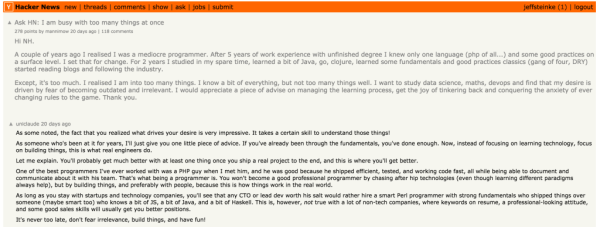At a recent coffee meeting a friend asked about a moving into the startup and technology world. He’s interested in changing careers but not sure how to go about it, if he’d be able to do it successfully, or if he’s crazy for even wanting to switch.
I’ve seen many people make the switch – some successfully and some not as much.
Perhaps the biggest lesson out of the gate is that it’s up to you. Nobody is going to magically transform your career except you!
As Jeff Hilimire says in a related post to new entrepreneurs on their startup ideas:
There is good news and bad news. The good news is, it matters very little what their current idea is for their startup, because EVERYTHING IS DEPENDENT ON THEM PERSONALLY. Then I told them that the bad news was the same…it matters very little what their current idea is, EVERYTHING DEPENDS ON THEM.
Similarly when looking to change your career, the good news is that the control is all in your own hands. The bad news is the same, it’s only in your hands.
So what does it take?
In one word, COMMITMENT!
Learn Everything You Can
First, become an expert.
This requires you to proactively educate yourself, be your own teacher. The good news is that moving into a technical field like software development doesn’t require a four year education. We’ve hired amazing programmers at BlueFletch who don’t have a technical degree, or don’t even have a four year degree for that matter!
In place of a classroom you’ll instead need to consume all the Books, Blogs, Forums and Podcasts that you can.

Can you COMMIT to reading 10 blogs a day, a book a week, and building 1,000 reputation points on Stack Exchange?
Attend a Developer Bootcamp
Across the street from our office General Assembly has been teaching eager students in three month intensive courses for the past year.

GA and others in this new space offer students a chance to immerse themselves in a new field and then get a running start when they graduate in three months.
One of the best benefits of the new developer bootcamp phenomenon are the job placement teams. Just like the career department at a traditional four year university, it’s in the interest of the bootcamp to get you placed quickly in a job you like, so that the company can build its reputation and recruit future students.
Can you COMMIT to the non-insignificant time and financial investment that a developer bootcamp requires?
Find Mentors
Facing a big career change, you likely have some questions, uncertainties and overall trepidation. Instead of going it alone, find other people who’ve been in your shoes to help answer your questions.
People – and as I’ve found especially in the tech community – people want to help you out. They want to pay it forward from those who helped them at one time. Network broadly across the areas you’re interested in and look to turn some of the best connections into mentors who are willing to invest in your career.
Can you COMMIT to Never Eat Alone, meeting one new person a day?
Ship a Side Project
In the tech world side projects can be the ultimate sign of COMMITMENT.
Side projects show a prospective employer that you’re serious about this new career path, that you won’t get cold feet and quit after a few months. After 100, 1,000 or more hours invested, no one will mistake your new career aspirations as a passing fad or a money grab for a higher salary.
But a side project isn’t all about the prospective employer. It’s for your benefit as well. Side projects give you the opportunity to develop real skills that make up for minimal resume experience. They also help you vet whether you’ll really like the work you’re looking to get into without risks like having to quit your current job.
The best part about side projects is that there’s nothing stopping you. Your own mobile app, your own marketing blog, your own website – they’re all extremely possible and usually require nothing more than your time. As Hacker News poster uniclaude explains,

I couldn’t agree with these two points any more:
- “You’ll probably get much better with at least one thing once you ship a real project to the end, and this is where you’ll get better.”
- “With startups and technology companies, you’ll see that any CTO or lead dev worth his salt would rather hire a smart programmer…who shipped things over someone [else, all things equal].”
Can you COMMIT to starting a project and seeing it through to completion?
Remember, the good news it that with the resources available today you have everything you need right in front of you. The bad news is that it’s up to you – and only you! – to take advantage of those resources.
Here’s your chance. Are you willing to make the commitment?